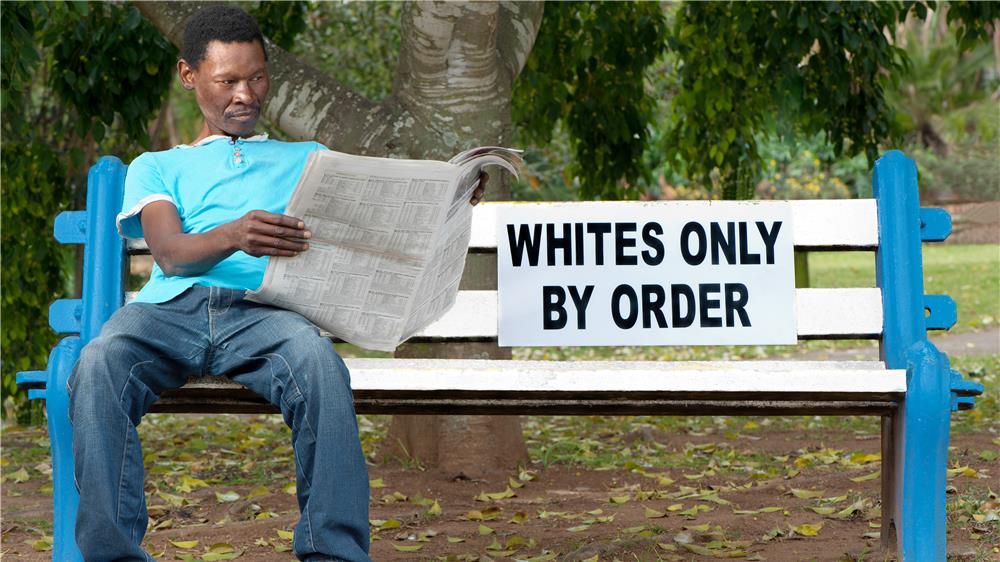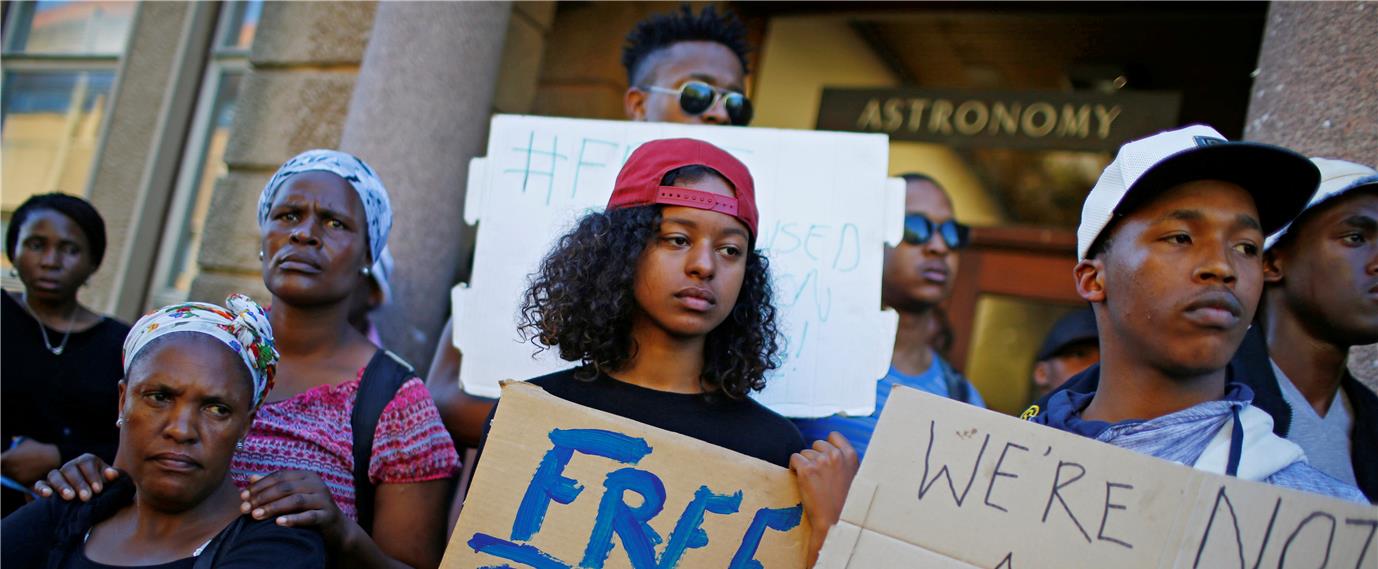يبدو أنّ تدريس الإعلام في أفريقيا لا يزال عالقا في مناهج النظام الكولونيالي الأوروبيّ، ونكاد لا نعرف سوى القليل عن الإنجازات المهمّة الهادفة إلى التخلّص من النزعة الكولونياليّة في نظم التدريس في مختلف الجامعات في القارة السمراء. ويمكن في الواقع لأي متابع لوتيرة الحراكات الطلابيّة في جنوب أفريقيا أن يدرك أنّ التعليم قد وصل إلى نقطة تحوّل مهمّة ستشهد أفول تلك الأنظمة التي تسعى للحفاظ على سياسات التعليم البائدة التي رسّختها الثقافات الأوروبية السائدة.
يشير وينستون مانو في دراسة أعدّها بعنوان "إعادة النظر في تدريس تخصصات الصحافة والإعلام في أفريقيا" أنّ المناهج الدراسيّة القديمة كانت "تُقحَم" إقحاما في معاهد التدريب، وأنّ معظم المدرسين كانوا قد تلقّوا تعليمهم في الغرب أو وفق المناهج الغربيّة أيضا، وقد ترافق هذا مع ضعف كبير في التجهيزات والمرافق والتمويل ونقص في عدد المدرسين والمدربين. لكن وبعد انقضاء عقود على هذه الحال فليس هناك توافق بعدُ على الكيفيّة التي يجب اتباعها لتدريس الإعلام، وقد نشأ عن هذا اختلاف التوجّهات ونقاط التركيز في برامج تدريس الصحافة والتواصل والإعلام.
ولا يزال الخلاف حول من وما يمكن اعتباره أفريقيا عاملا أساسيًّا فيما يجب إدراجه أو تجنّبه في برامج تدريس الصحافة الأفريقيّة ما بعد-الكولونياليّة. ولا يقتصر هذا الجدال على تناول مسائل تتعلّق بتحديد ما يجب أن يتمتّع به المدرّس في مجال الصحافة في هذا الوقت، أو مفهوم الصحفي الناشط في القارة الإفريقية، بل إنّ هذا الجدال يعود إلى تحديد جوهر أن يكون المرء أفريقيا في المقام الأول.
هل يمكن مثلا أن تُصنّف أعمال الأفارقة البيض الذي وُلدوا ونشأوا في أفريقيا على أنّها أفريقيّة؟ وماذا عن أعمال الأفارقة في المهجر؟ وهل يجدر إدراج بعض أعمال السود في أميركا في المناهج المحليّة في أفريقيا؟ هل تسهم اللغة الإنجليزيّة في تعزيز الأجندة الكولونياليّة في هذه القارّة التي تمتاز بتنوّع لغويّ هائل؟
لقد كانت هذه الأسئلة بالغة الحساسيّة موضوعَ دراسة أجريت مؤخّرا شارك فيها 31 أكاديميًّا يعملون في تخصّصات الإعلام والصحافة في أفريقيا الجنوبيّة، وقد أشرفت عليها بيفلين دوب، الأستاذة في جامعة فيندا (University of Venda). كان العديد من الأسئلة المطروحة والإجابات التي تم الحصول عليها يستحقّ في الواقع دراسة أكبر حجما بكثير من هذه الدراسة، ومع ذلك فإنّ ما ورد فيها يكشف ولا ريب عن أزمة حقيقيّة في التعليم في أفريقيا الجنوبيّة وجامعاتها، وهذه الأزمة تدور حول سؤال: الأفرقة أم نزع الطابع الغربي؟
وتشير نتائج الدراسة إلى أنّ الباحثين في تخصّص الصحافة لا يفسّرون "نزع الطابع الغربيّ" أو (De-Westernization) على أنّه التخلّص الكامل من الفلسفات ونظريّات المعرفة الغربيّة من مناهج تدريس الصحافة، كما أنّهم لا ينظرون إلى عمليّة "الأفرقة" (Africanization) على أنّها الاكتفاء باعتناق القيم والأعراف الثقافيّة لشعوب القارّة الأفريقيّة. وتشير النتائج إلى أنّ عمليّة الأفرقة تأخذ بالاعتبار ذلك التنوّع الواسع في أفريقيا على مستوى الثقافة واللغات والعادات.
أمّا الآراء العنصريّة التي تدعو إلى أن تكون أفريقيا منغلقة على نفسها فقد كانت محلّ رفض الجميع في الدراسة، وهذا ما دعا الباحثة دوب إلى أن ترى أنّ الثقافة الأفريقيّة "ليست جامدة، بل إنّ الثقافات الأفريقية مزيج غنيّ من التأثيرات من داخل القارّة وخارجها". وهذا الاعتراف بالعولمة وتأثيرها الذي لا يمكن إنكاره على أفريقيا ينطبق كذلك على اللغات، إذ أشار الكثير من الأكاديميين المشاركين في الدراسة إلى ضرورة استخدام اللغات التي ورثها الأفارقة عن الحقبة الكولونيالية وذلك لأنّ هذه اللغات قد باتت جزءًا أساسيًّا ومن الهويّة الأفريقيّة ما بعد الكولونياليّة.

أمّا الفلسفة الأفريقيّة، ذلك الحقل الذي يدور جدلٌ كبيرٌ حتّى على اسمه، فقد احتلّ الحديث عنها أولويّة بارزة في إجابات جميع المشاركين في الدراسة تقريبا، إذ أكّدوا على أنّ الأعمال التي أنجزها أولئك المعنيّون بحقل الفلسفة الأفريقيّة وتدريسها هو الدليل الأكثر أهميّة في الوقت الحاضر والذي يجدر أن يتمّ الاعتماد عليه في تحديد المسار الذي يجب أن يسلكه تعليم الصحافة والإعلام في القارّة الأفريقيّة.
وقد نظرت شخصيًّا إلى الخطّة الدراسيّة كطالب للفلسفة الأفريقيّة في جامعة جنوب أفريقيا (UNISA)، وتعرّفت إلى المشروع الذي يعمل عليه مختصّو الفلسفة الأفريقية. هذا المشروع الفلسفيّ ضخمٌ بالفعل، ويتعرّض لتحدّيات وانتقادات من قبل الأقران ذوي التوجّهات الغربيّة في كلّ مرحلة من مراحل تطوّره، ولكنّ هذا المشروع الذي يسعى إلى تحديد الشكل الذي يجب أن يصل إليه التعليم في أفريقيا يدلّ على منهجيّة تقدّمية عير مسبوقة فيما يتعلّق بالتعليم.
ولكن ما الذي يحدث حقًّا بخلاف هذا الجدال؟ إنّ صفة "الأفريقيّ" بذاتها، أمر إشكاليّ، وهذه حقيقة لا يمكن إنكارها، ولكنّ هل حان الوقت الآن للتوقّف عن الجدال والتركيز بدل ذلك على الكفاح من أجل التخلّص من بقايا الاستعمار، وذلك عن طريق رفض السماح للقوى الاستعماريّة السابقة بالاستمرار بفرض هيمنتها على قطاع التعليم؟
قد يرى الطلبة الناشطون في حراك "فلتسقط الرسوم الجامعيّة" (#Feesmustfall) أنّه لا يمكن تضييع المزيد من الوقت. ولقد شهدنا مطلع هذه السنة، كيف أثار آلاف المتظاهرين في العديد من الجامعات الرعبَ حين قاموا بإشعال النيران في مكتبات الجامعات، مطالبين بتغيير المناهج والتخلّص من النزعة الكولونياليّة فيها.
لا شكّ أنّ ما قام به أولئك الطلّاب قد جنح إلى التطرّف، ولكن من المفروض أن يسترعي هذا التصرّف الانتباه، وقد كان لهم ذلك، على الصعيد العالميّ. يرى أولئك الطلبة ضرورة تنقية المكتبات من المصادر الكولونياليّة كي تكون الظروف البحثيّة مناسبة لجيل جديد من المفكّرين. وقد يتساءل البعض منّا قائلًا: "لكن وماذا عن المعلومات التي ستضيع وتلتهمها النيران أمام أعيننا؟، وقد يقول بعض الانهزاميين: "ليس بالإمكان أن نمحو الماضي"، وقد يرى آخرون أنّ هذه الجهود عبثيّة وطفوليّة وليست سوى ردود فعل عابرة.
إنّ ما حصل هو استجابة تنمّ عن حالة من الإحباط والغضب حيال الوضع القائم الذي قد يجهض سنوات من الجهد والعمل الذي بذلته المدارس والجامعات لإعادة كتابة الخطط الدراسيّة والمناهج. لكن ثمّة أمر آخر قد يكون مقلقًا أكثر، فالطلبة على حقّ، والكارثة حقيقيّة. ولتوضيح حجم المشكلة يكفي أن نشير (وفق دراسة لموكاسا و بيكر عام 1992) إلى أنّ 20 بحثا أكاديميًّا اختيرت عشوائيًّا من مؤتمر للتواصل والإعلام عقد في نيجيريا عام 1987، قد كانت الاقتباسات من مصادر غربيّة تشكّل 87 بالمئة من مجمل النقول الواردة فيها.
ولقد حاولت منظّمات دولية مثل اليونسكو أن تعالج المشكلة عن طريق تقديم "مناهج أنموذجيّة"، حيث يبقى السؤال هو كيف يمكن لتعليم الصحافة والإعلام في القارّة الأفريقيّة وخارجها أن يستمر في تجديد نفسه. وقد سعى المؤتمر التدريبيّ الأخير، والذي جاء بعنوان "الورشة الأفريقيّة للإنتاج الإعلاميّ المهنيّ" والذي دعي إليه المشتغلون في تعليم الصحافة والطلبة والصحفيّون الصاعدون، إلى التفكير بحلّ هذه المشاكل عبر حلول بنّاءة يقدّمها أفضل المختصّين في هذا القطاع.
ورغم ما يظهره البعض من رفض لمحاولات "عولمة" المناهج أمام التحرّكات الكبرى الساعية للتوطين، أو تعزيز الهويّة المحليّة، إلا أنّه من الضروري أن تشهد القارّة الأفريقيّة المزيد من مثل هذه المؤتمرات والورش، لتكون فرصة للنقاش في بيئة آمنة ومفتوحة حول القضايا والخلافات، والتي يمكن أن يشارك فيها الشباب للنقاش مع الأساتذة والخبراء، من أجل التوصّل لبناء حالة جديدة، تكون أفريقيّة بامتياز، على افتراض إمكانيّة وجود أمر كذلك.








































